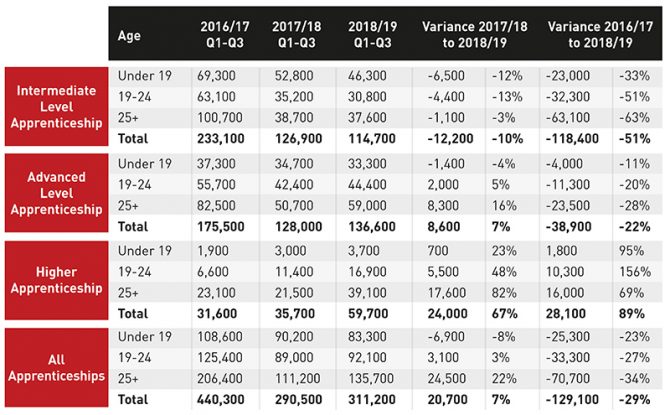Apprenticeship starts for 16- to 18-year-olds have continued to fall, and level 2 starts have dropped by more than 50 per cent since the apprenticeship reforms were introduced, according to the latest government statistics.
Skills minister Anne Milton said she was “pleased” that starts overall have risen by seven per cent between the first three-quarters of 2017-18, and the same period in 2018-19.
However, that rise is thanks to 82 per cent more people aged 25 and over doing higher-level apprenticeships at levels 4 and above, according to FE Week analysis.
Meanwhile, starts at level 2 have plummeted by 51 per cent and starts by 16- to 18-year-olds have dropped by 23 per cent since the year before the apprenticeship reforms were introduced in May 2017.
In that time, starts by those aged 25 and above at levels 4 upwards increased by 69 per cent.
The Association of Employment and Learning Providers chief executive Mark Dawe said in response to the findings that the government’s social mobility agenda is “unravelling before our eyes”.
“Non-levy employers are now being starved of funding and it’s smaller businesses who have traditionally employed young apprentices at lower levels,” he continued.
Dawe said the £5 billion legacy fund the prime minister had negotiated with the Treasury, as reported in The Times on Monday, should be used to “put this right” immediately, rather than it waiting until this year’s spending review.
The figures come amid a Department for Education-commissioned investigation into why level 2 starts have dropped.
Problems with people starting higher-level apprenticeships have dogged the apprenticeship system since the introduction of the levy.
The increased per-start costs of higher apprenticeships, such as the controversial level 6 chartered manager programme, led the Institute for Apprenticeships to warn in December that the apprenticeship budget could be overspent by £0.5 billion this year, rising to £1.5 billion during 2021-22.
An FE Week investigation in March revealed that £70 million of apprenticeship funding would have been blown by then on the level 7 accountancy/taxation professional standard from when it was approved to July 2018.
Ofsted chief inspector Amanda Spielman, in her 2018 annual report, warned the budget was being spent on graduate schemes “rebadged” as apprenticeships.
Then in March, the National Audit Office piled in, warning the DfE employers are developing and choosing more expensive apprenticeship standards at higher levels than was expected, which is “absorbing” funding.
It found that the average cost of training an apprentice hit £9,000 – double what the government predicted.
During her speech at the Association of Employment and Learning Providers conference last month, Anne Milton said the most palatable option for constraining the apprenticeship budget was a pre-apprenticeship salary cap.
Constraining spending is one of the “hard choices” that would have to be made in the face of the imminent overspend, her department’s permanent secretary, Jonathan Slater,
told the Commons Public Accounts Committee.
The AELP has called for level 6 and 7 apprenticeships to be frozen out of levy funding to relieve pressure on the budget, after it estimated at least £573 million had been committed to programmes at that level since August 2016.
A DfE spokesperson said: “We are looking carefully at what the priorities for the apprenticeship programme should be in the future in the run-up to the spending review.”










This was entirely predictable – and indeed was predicted in 2017. Levy payers, quite rightly for them, are looking to recover the money they are being “invited” to share with HMRC. The rise in “re-badged” management programmes is not really a surprise either – and again was predicable. The catastrophe is unwinding at the workforce entry levels (Level 2 and 3) and in smaller employers. Simply put the Apprenticeship funding does not work for SME employers – the business case just isn’t robust and no amount of incentives and/or emotional appeals will change this. Neither is the answer to “force” employers to behave in any particular manner ; or to “freeze out” any provision – forcing employers doesn’t make any sense in the real world – all you will get is resistance.
Might I suggest that the answer is to listen to what employers and providers are saying; commissioning yet another investigation at tax payers expense is not the answer – especially when the outcome is again “entirely predictable”. Might I suggest that scrapping the minimum average time requirement (sometime called OJT) would help us provide a much more robust business case for Apprenticeships without disadvantaging anyone? The rational for the 20% OJT is fallacious in any case when you consider that Apprenticeship standards require individualised learning plans. We should be looking for (in cooperation with OfSTED) at an “appropriate” OJT commitment dependent on employer and Apprentice needs – not a dogmatic adherence to a “one size fits all ” approach premised on some bizarre concept of equity and fairness.
The bottom line for most employers is just that …. the “bottom line”. So we must understand that a 20% employee productivity drop from the get go provides an insurmountable barrier to entry for some employers and a strong case not to engage for others. This is not an opinion it is a fact borne out of many many conversations with the owners and directors of smaller businesses.
Although entirely predicted this is still scandalous. As is the fact that many Training Providers can no longer recruit 16-18 for SMEs due to reduction of non-levy contracts and clear statement by the ESFA that over delivery will not be funded. The reduction in 16-18 starts due to ESFA constraints is reprehensible. As is the increase in 19+. Large employers, rightly so, will choose to spend their levy as they can – many by putting older, experienced employees on Apprenticeships rather than recruiting new 16-18 as was the Governments ill fated intention. I am appalled that some Providers have to turn young people away as they don’t have the budget to train them. Will be interested to see what happens to the £37 million unused levy the Government have ‘inherited’.
Industries such as the film & television industry rely on freelance technicians and freelance accountants & managers. These fall out of the very narrow criteria imposed by the DfE. We have employed hundreds of trainees that now form the back-bone of freelance camera & lighting technicians but are currently unable to convert these to apprenticeships because a. We have zero benefit of losing them one day a week b. Colleges & academies are not geared for our sector c. CreativeSkills have failed to provide a workable framework (they too are stuck with the DfE criteria).
A rushed scheme that’s not fit for purpose.